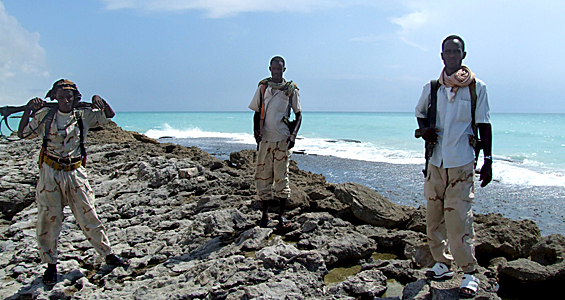Security firms to combat pirates
Private firms are seeing a boom in business as the cost of piracy insurance rises.

 |
| Piracy and instability have made the waters around Somalia the most dangerous in the world [EPA] |
Ship owners around the world are hiring private security firms to accompany their fleets around the Horn of Africa following the dramatic increase in piracy in the region.
Though Somali pirates were reported to have attacked merchant ships a few years ago, their activities have significantly increased in recent months.
This has fuelled a boom in business for maritime security firms, but also led to an increase in piracy insurance costs.
Policies have risen from $3,000 for a whole year to as much as $60,000 for a single journey through the Gulf of Aden.
Water cannons
The teams keep a careful watch for pirate activity and are on hand to help repel any would-be attackers.
Nick Davis, the chief executive of Anti-Piracy Maritime Security Solutions (Non-Lethal), which is based in the UK, has 10 teams on board ships in the region.
One team recently repelled an attack on a 150-metre chemical tanker using evasive ship manoeuvres, such as fast acceleration and weaving, plus high-powered water cannons.
 |
| Nick Davis has 10 security teams on board ships in waters around the Horn of Africa |
Speaking to Al Jazeera, Davis, a former British army soldier, said: “As the pirates got to within 500m they realised there was a team on board and so they didn’t bother coming any closer.
“They showed their weapons and then went due south and then actually fired on the ship that was a few miles behind ours,” he said.
Davis said the presence of his team aboard a ship that would have normally been targeted highlights the benefits of private security firms for maritime purposes.
Not enough
Despite this, the majority of the world’s tanker owners say private measures alone are not enough, arguing that governments need to provide military support in dangerous waters.
Peter Swift, the managing director of Intertanko, the association of independent tanker owners, said: “We really do call on governments to provide that support, to make sure we have naval vessels, other military support to protect the seafarers, to protect the sea lanes, to protect the trade.
“At the end of the day it is us as consumers – and we are all consumers – who are beneficiaries and we are looking to government for support.”
Security void
However, with many navies reticent to fire on pirates, private firms are continuing to fill the security void.
Chris Austen, the chief executive of Maritime and Underwater Security Consultants, has been in the maritime security business for decades.
His office is located in an old escort ship tied up in central London on the River Thames, where military analysts chart the latest pirate attacks in the Gulf of Aden on a large computer screen.
The map of the region is cluttered with red, orange and yellow dots – marking hijackings, attacks and pirate sightings.
There is also a large weather screen showing prevailing winds and tides through the waters.
All the information is compiled and then presented in briefings to ship captains and sea-farers heading for the region.
Amateurs
On the other hand, Austen worries that the new opportunities to provide security could attract companies without the necessary experience.
 |
| Red, orange and yellow dots on a screen mark hijackings, attacks and pirate sightings |
He said: “One of the things we always see in times like this is the sudden proliferation of people trying to call themselves experts in this kind of business and they will go out unprepared not understanding the dynamics of this kind of business.
“My concern is that something will go badly wrong with people going out who don’t have the right kind of experience.”
Nevertheless, experts agree that the ultimate solution to the piracy problem lies on the ground in Somalia where people are starving, jobs are non-existent and there is no rule of law.
However, fixing the failed state system in Somalia could take years; in the interim, it is likely private security firms will continue to flourish in dangerous waters.